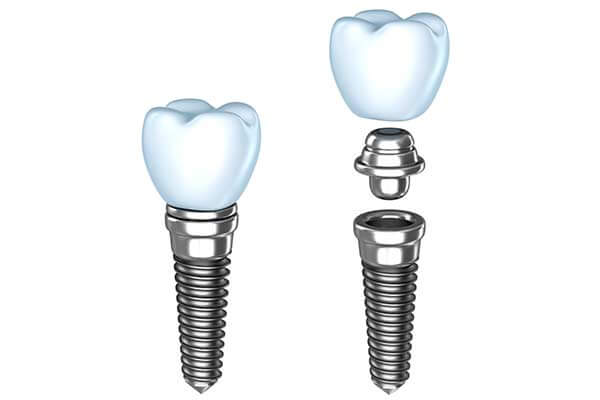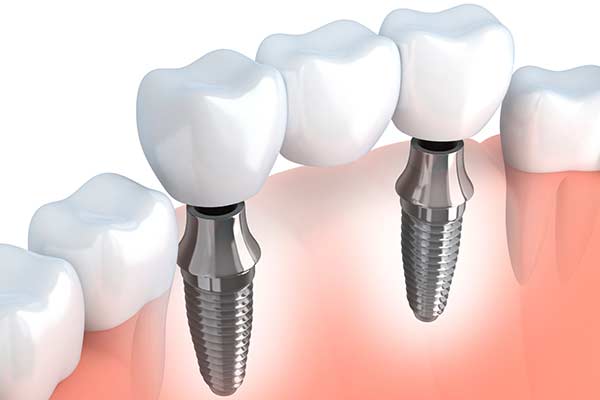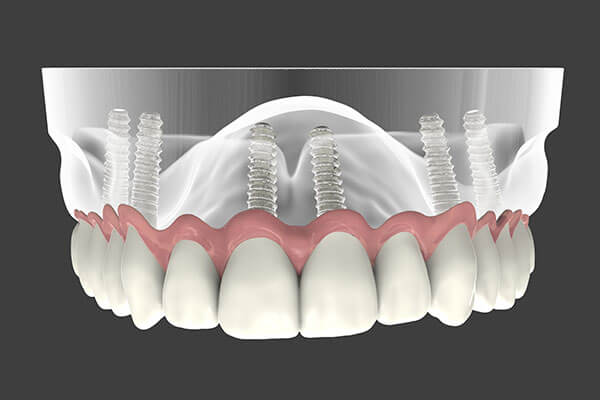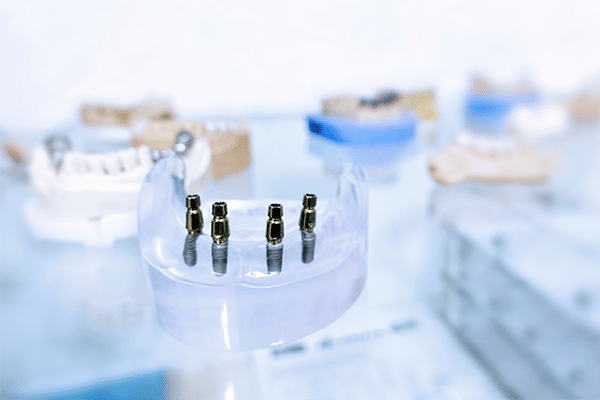Dental Implants in Suwanee, GA
Suwanee Family Dentistry provides dental implants in Suwanee, GA. Call our dentist office at 678-714-2380 for innovative treatment options, to learn more about implant surgery, and to schedule your appointment.

What Are Dental Implants?
Unlike other solutions for missing teeth that only replace the crowns, natural looking dental implants replace both the crown and the root. This is important because it means dental implant placement can prevent bone loss in the jaw. The result is a stable, long-lasting restoration that looks, functions, and feels more like a natural tooth for better oral health.
The dental implant is a small screw or post that is surgically implanted into the jawbone to replace the root of your tooth. Dental implants are paired with a restoration to replace the visible portion of your tooth, and they often have an abutment that connects these two parts. Full dentures, partial dentures, bridges, and crowns can all be supported by dental implants.

Implant Supported Bridges
An implant supported bridge is a restorative solution for spaces where three or more neighboring teeth are missing. This restoration typically requires two implant placements to support the porcelain bridge. The bridge provides a functional and aesthetic replacement for a patient’s natural teeth.
What are the advantages of an implant supported bridge?
Because of the natural look and feel of the porcelain and the functional stability provided by the implants, implant supported bridges are an effective solution to replace multiple missing teeth.
A traditional bridge uses teeth on either side of the gap where teeth are missing for support. An implant supported bridge uses two or more dental implants rather than the adjacent teeth. When a bridge uses natural teeth for attachment, the natural teeth must be prepped for crowns and become subject to damaging stress which may be damaging - particularly if the existing tooth, roots, or surrounding bone structure are already compromised. A dental implant supported bridge replaces your missing teeth and avoids putting any additional stress on your natural teeth.

Implant Supported Dentures
For patients missing many or all of their teeth, implant supported dentures may be an alternative to traditional dentures. This solution requires the placement of two or more implants. When replacing a full arch denture, a minimum of four implants is generally recommended. Eligibility for this solution is dependent upon several factors, with jaw bone density being one of the most significant determining factors.
Implants can support both full and partial dentures as well as both fixed and removable dentures. If a removable denture is selected, the denture will “snap” onto the implant rather than requiring the use of denture paste or adhesives. Removable dentures can be taken out for cleaning at night.
Why should I consider implant-supported dentures over traditional dentures?
This technique offers many advantages over traditional dentures. While traditional dentures rely on an acrylic base that is held in place by a paste or adhesive, implant-supported dentures remain securely fixed in place with the implants acting as anchors. Using implants as supports for dentures allows for a smaller and more comfortable base and less shifting of the prosthesis during use. Patients will not experience the primary concerns associates with dentures, such as the typical rocking and movement or gum irritation.

Full Arch with 4 to 6 Implants
This unique implant solution offers patients who are missing all of their upper or lower teeth a more comfortable alternative to traditional dentures. Patients can often leave the same day with a full arch of teeth, reducing overall cost and healing time.
Using 4 to 6 implants as “anchors” as a base for a complete set of teeth provides a sturdier fit and minimal mobility for your denture. No adhesives and pastes are needed to secure your new denture, so you can remain confident while eating food and functioning normally. Also, with implant supported dentures, there is no plate covering the roof of the mouth, so speaking and eating are more natural and comfortable than with traditional dentures.
Call 678-714-2380 to schedule an appointment.
Benefits of Dental Implants
Longevity
Although the restorations supported by dental implants may need to be replaced, the dental implants themselves have the potential to last a lifetime with good care and maintenance.
Better Health
By preventing jawbone loss, dental implants restore oral health and better general health because you can eat the nutrient-rich whole foods your body needs to thrive.
Improved Confidence
You’ll feel confident because dental implants transform your smile, and your implant-based restoration will look, feel, and function just like natural teeth.
Are You a Good Candidate for Implants?
You are likely a candidate for dental implants if you are in generally good health, don't currently have gum disease, don't use tobacco, and have adequate bone mass in the jaw. If you’ve experienced jawbone loss, you may be a candidate for a different type of dental implant that requires less support from the jaw, or you may be a candidate for traditional dental implants after a bone grafting procedure for tooth loss.
Why Choose Suwanee Family Dentistry
As a comprehensive family dental practice, we provide exceptional care with all steps of the dental implant process in-house for your convenience. You won’t need to have to go to multiple specialists and facilitate communication between different practices because we have an oral surgeon on-site who has advanced training in dental implant procedures.
Frequently Asked Questions About Dental Implants
How much do dental implants cost?
The only way to know how much dental implants will cost for you is to visit our office for a consultation. There are a number of different types of dental implants and restorations, and the cost depends on your unique needs.
Who is not a candidate for dental implants?
You may not be a candidate for the dental implant process if you smoke or have active gum disease. If you have a medical condition that increases your risk of infection or impacts your ability to heal, you may either not be a candidate for implants, or certain precautions must be taken during and after your procedure to ensure the best possible patient experience.
Is it better to get dentures or implants?
Dental implants are usually recommended over traditional dentures for damaged teeth because they prevent bone loss from tooth extractions, but every patient is different. We can help you decide the best option with personalized care for you during your consultation.
Can I get a dental implant years after extraction?
Yes, it’s common for patients to get dental implants years, or even decades, after having tooth extractions. There’s no reason why this would preclude you from implant surgery, although you are more likely to need bone grafting prior to your procedure.
Call 678-714-2380 to learn more and schedule your appointment.
